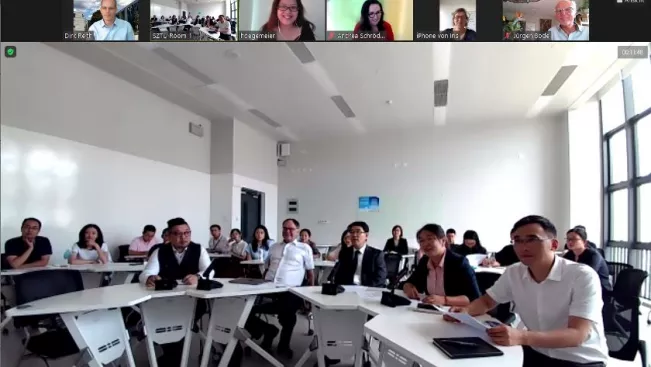Centre for Teaching Development and Innovation (ZIEL)
Joint international workshop on advanced teaching methods held by H-BRS and Shenzhen Technology University

The pandemic is not setting us apart from international cooperations with global partners. In June 2021, the virtual workshop "How to teach deep learning - collaborative workshop on advanced teaching methods" has been conducted jointly by the H-BRS' Centre for Teaching Development and Innovation (ZIEL) and Shenzhen Technology University (SZTU), China.
At the opening ceremony on 15 June, Prof. Dr Shuangchen Ruan (President of SZTU), Prof. Dr Jürgen Bode (Vice President International Affairs and Diversity, H-BRS), Assoc. Prof. Siyu Zeng (Director, International Cooperation and Student Affairs Office, SZTU), and Dr Zhanlu Ma-Högemeier (Coordinator China Cooperation, H-BRS) warmly welcomed experts and guests from both universities.
The workshop was aimed at building up close and active communicatios with Chinese teaching staff such as young professors and young lecturers with an introduction in modern teaching models and activating teaching methods. It emphasised problem-solving learning methods as well as project and competence oriented learning and teaching.
The team of instructors were composed of H-BRS experts in Didactics: Andrea Schröder (Administrative Director, ZIEL), Prof. Dr Dirk Reith (Director of Institute of Technology, Resource and Energy-Efficient Engineering (TREE), Prof. Dr. Iris Groß (Director, ZIEL), Vice Dean of the Department of Electrical and Mechanical Engineering and Technical Journalism). They all have abundant experience in international teaching and workshops, for example in India, Turkey, Ghana, and the United States. During the workshop, our experts worked with the 18 SZTU participants to look for new approaches to teaching and learning, apply constructive alignment and develop supportive learning methods.
The young Chinese professors and lecturers received certificates from ZIEL for their successful participation in the workshop. With the satisfactory outcomes confirmed from both universities, we are going to continue our collaborative workshop as an annually occurring event, as a bridge for deep understanding in intercultural communication and close interaction between German and Chinese teachers. The joint workshop was an important step in expanding the partnership between H-BRS and SZTU.